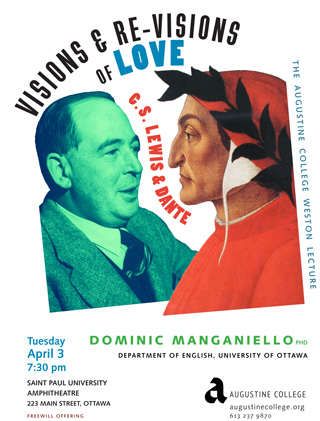SHARE: on Twitter on Facebook
Our 21st annual Weston Lecture, titled Visions and Re-visions of Love: C.S. Lewis and Dante, was given by Dominic Manganiello:
The luminous figure of Dante cast a long shadow over the modern literary imagination. The brilliance of The Divine Comedy radiated widely over several generations of twentieth-century writers, including the Inklings. C.S. Lewis in particular hailed Dante as “a strong candidate for the supreme poetical honours of the world,” and drew inspiration from the Florentine poet’s literary masterpiece and other writings for his own project of infusing new life into old tales. Like his great medieval predecessor, Lewis was steeped in St. Augustine’s affective theology which was based on the understanding of virtue as rightly ordered love. Dante, in fact, had used the Augustinian exhortation, “set [your] loves in order,” as the epigraph for the second part of the Comedy. Lewis became captivated also by Dante’s account in the Vita Nuova (The New Life) of how, after a number of wrong turnings, he had come to understand the true nature of love and was eventually led to salvation by the greeting of a young girl named Beatrice. These treatments of an individual’s changing perceptions of love inspired Lewis to explore many variations of the virtues and perils of affection in his own fiction. He adopted Dante’s literary technique of the dream vision notably in The Great Divorce and in Till We Have Faces to illustrate the key notion that love involves the exercise of free will and moral choice. In the lecture, I will focus on some representative scenes from these novels in which Lewis, like Dante before him, presents the dynamics of love as the “drama of the soul’s choice.”
Dominic Manganiello has been a Professor of English Literature at the University of Ottawa for many years and was a founding member of Augustine College. He has written extensively on canonical modern authors, focusing in recent years on the neo-medievalism of a group of writers that includes Wendell Berry, G.K. Chesterton, Dorothy L. Sayers, J.R.R. Tolkien, Charles Williams, and C.S. Lewis. He has examined in particular the literary impact of Dante’s medieval masterpiece on the Christian imagination of the Inklings.
He is the author of Joyce’s Politics (1980; reprint 2016), T.S. Eliot and Dante (1989; reprint 2015), as well as co-authoring with David L. Jeffrey Rethinking the Future of the University (1998).
Event Bio


